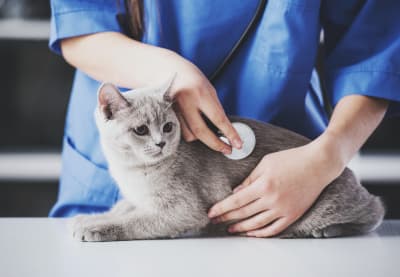As cat owners, we worry when Fluffy is feeling sick, and for good reason - many cat illnesses and symptoms can impact their long-term physical health and wellbeing, or even be fatal if not treated soon enough. Our Huntersville vets offer advice about signs of illness.
Common Cat Illnesses
At times, it may be difficult to tell whether your cat is sick and if they require medical attention from a veterinarian. There are some signs cat parents need to be on alert for. You should also be prepared to visit the veterinarian for a diagnosis if required, especially since cats tend to isolate out of instinct when ill. Here are 3 common cat illnesses and their symptoms.
Cancer
An uncontrolled growth of cells can lead to cancer, which may affect a wide range of cells and organs in a cat’s body. At first, the disease develops within a cell before attaching to tissue below the skin and potentially spreading to other parts of the body.
A common contributor is Feline Leukemia Virus (which cats can be vaccinated against). Toxins in the environment can also cause this disease. If discovered during a physical exam, a veterinarian may be able to treat the cancer.
Symptoms include:
- Sores that do not heal
- Lumps or bumps that change in shape or size
- Unexplained bleeding or discharge
- Difficulty urinating or defecating
- Marked increase or decrease in appetite
- Chronic weight loss
- Odor from the mouth
Depending on the type of cancer and its extent, where the tumor is located, if it is diagnosed in its early stages, whether an effective treatment plan can be established and carried out, and other factors, several potential treatments such as radiation, surgery and chemotherapy may be used.
Upper Respiratory Infections
Bacteria and viruses may cause infections in your cat’s upper respiratory tract - their nose, throat and sinuses. Often identified in multi-cat households and shelters, the feline herpesvirus and feline calicivirus can infect cats through something as simple as sharing a food or water bowl.
They can then carry the virus to other cats the same way or through sneezing or coughing, or during grooming.
Symptoms include:
- Runny nose or clear/colored nasal discharge
- Gagging, drooling
- Sneezing
- Fever
- Congestion
- Cough
- Decreased or lost appetite
Diabetes
If a cat isn’t producing enough insulin to balance blood sugar or glucose levels, they develop diabetes mellitus. Left untreated, it may lead to numerous symptoms, including:
- Motor function problems
- Dehydration
- Thirst
- Increased urination
- Vomiting
- Increased appetite (as the body is unable to use the energy in food) or loss of appetite
- Coma
- Death
Poorly controlled diabetes can shorten your cat’s lifespan and result in several health problems, severe emergency situations and nerve disorders. Treatment will focus on disease management and may include insulin injections.
What should I do if my cat is ill?
If your cat is sick and exhibiting any of the symptoms listed above, it’s critical to bring them to a vet as soon as possible. At LakeCross Veterinary, we have an in-house laboratory, onsite pharmacy and availability for same-day appointments to provide your pet the care they need. Help for emergencies during regular and after-hours is also available.
When your cat is ill, every minute counts. Beginning treatment right away could reduce recovery time, and even save your pet’s life.
When should my cat see an emergency vet?
Veterinary emergencies need immediate attention and care. If your cat is showing any of the following symptoms, it’s imperative to get them to an emergency veterinarian:
- Unconsciousness
- Choking, difficulty breathing or continuous gagging/coughing
- Seizures or staggering
- Severe bleeding
- Severe vomiting or diarrhea (2 or more episodes in 24 hours)
There are several more indications of an emergency to watch for.
How can common cat illnesses be prevented?
Prevention starts by providing your cat a clean, low-stress and happy home, with lots of fresh water to drink. Routine checkups at feline-friendly veterinarians and preventive care go a long way to keeping your furry friend healthy, as do exercise, a healthy diet and regular vaccinations.
Cat not feeling well? With our in-house laboratory, we can provide same-day testing and results. Book an appointment today.
Looking for a vet in Huntersville and Mecklenburg County?
We're always accepting new patients, so contact our veterinary hospital today to book your pet's first appointment.
Related Articles View All
Puppy’s First Vet Visit: Checklist & What to Expect
Set your new puppy on the path to good health by getting the most out of each vet visit. Here is what you can expect from your puppy's first vet visit, along with a checklist of things to take and questions to ask your vet.
Is there a natural treatment for hyperthyroidism in cats?
Are you concerned about the side effects of your cat's hyperthyroidism treatment? Are there any natural remedies for hyperthyroidism in cats? Find out in today's blog post.
Kitten's First Vet Visit: What to Expect
So you have just brought home a little bundle of joy. Congratulations! But make sure you're scheduling your first veterinary appointment, as well as routine exams going forward. To help you prepare, our Huntersville vets discuss what to expect at your kitten's first appointment.
How often should I take my dog to the vet?
Regular veterinary care including checkups, parasite prevention, and vaccinations are the key to keeping your dog healthy throughout their lifetime. But, how often should you take your dog to the vet, and how can you save money? Read on to find out.

